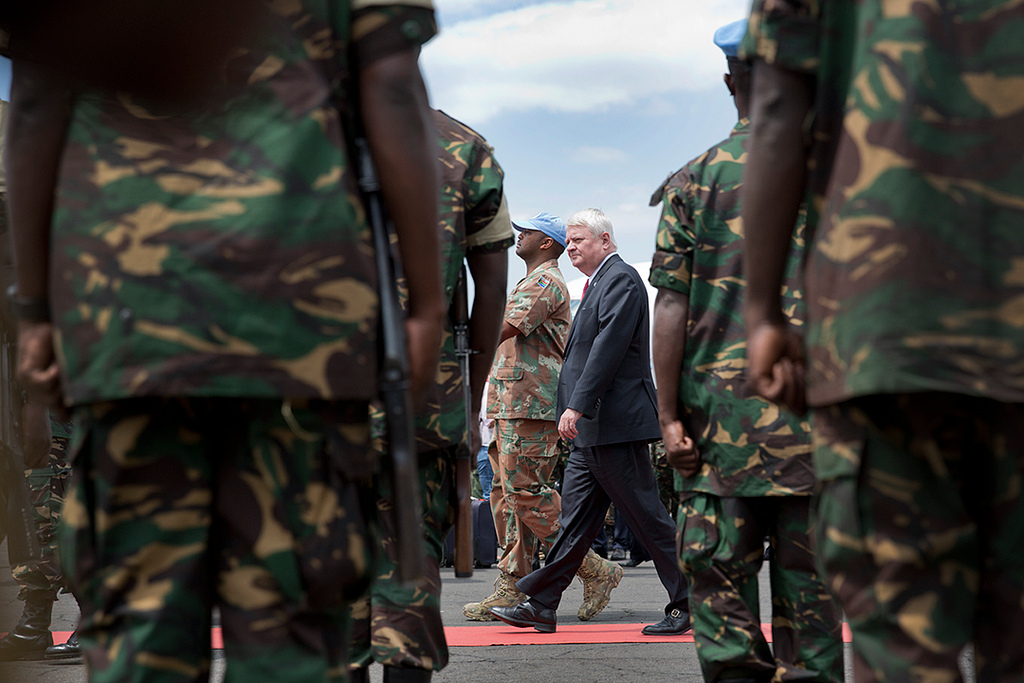Headline
UN calls on ‘countries with influence’ to press for release of 45 abducted UN peacekeepers

The UN Under-Secretary-General for Peacekeeping Operations, Hervé Ladsous (center and in a dark suit), is received with full military honors on his arrival in Goma, eastern D.R. Congo. Photo from MONUSCO / Sylvain Liechti / Flickr.
The U.N. Security Council called Wednesday on “countries with influence” to press al-Qaida-linked insurgents to release 45 U.N. peacekeepers from Fiji abducted last week in the Golan Heights.
A press statement approved by all 15 council members after a briefing by U.N. peacekeeping chief Herve Ladsous again demanded the immediate and unconditional release of the Fijian peacekeepers.
Heavy clashes have raged in the Golan Heights since Syrian rebels captured a border crossing between Syria and Israel near the abandoned town of Quneitra last Wednesday. Fighters from al-Qaida’s Syria branch, the Nusra Front, abducted the Fijian peacekeepers and surrounded two Filipino contingents serving in the U.N. force known as UNDOF the following day.
The Security Council welcomed the news that all the Filipinos were safe and commended the U.N. peacekeeping mission’s quick reaction force for its assistance.
Ladsous told reporters the peacekeepers have shown “steadfastness and courage” and said the U.N. is working to obtain the swift and unconditional release of the Fijians.
“We are sparing no effort to obtain the release of the detained peacekeepers,” he said, but gave no details stressing the importance of “discretion.”
Fiji commander’s Brig. Gen. Mosese Tikoitoga said Tuesday that the Nusra Front has made three demands for the release of the peacekeepers: It wants to be taken off the U.N. terrorist list, wants humanitarian aid delivered to parts of the Syrian capital Damascus, and wants compensation for three of its fighters it says were killed in a shootout with U.N. officers.
The Nusra Front accused the U.N. of doing nothing to help the Syrian people since the uprising against President Bashar Assad began in March 2011. It said the Fijians were seized in retaliation for the U.N.’s ignoring “the daily shedding of the Muslims’ blood in Syria” and even colluding with Assad’s army “to facilitate its movement to strike the vulnerable Muslims” through a buffer zone in the Golan Heights.
UNDOF was established in May 1974 following intensified firing on the Israel-Syria border after the 1973 Arab-Israeli war.
Israel captured the Golan Heights from Syria in 1967, and Syria has campaigned for decades for return of the land. For nearly four decades, the U.N. monitors helped enforce a stable truce between Israel and Syria but the Golan Heights has increasingly become a battlefield in the more than three-year-old Syrian conflict.
The mission currently has troops from six countries: Fiji, India, Ireland, Nepal, Netherlands and the Philippines. A number of countries have withdrawn their peacekeepers due to the escalating violence.
Fiji’s commander says the nation won’t abandon its mission in Syria, and he is even willing to replace the 45 troops if they need to recuperate if and when they are released.
Ladsous said UNDOF has been strengthened with armoured equipment and other military hardware.
“I think it’s very important that the mandate of UNDOF which has contributed to stability should continue,” Ladsous said.
U.S. Ambassador to the U.N. Samantha Power also said Wednesday that UNDOF’s “original purpose is still critically important” and that the spillover from Syria’s conflict “only underscores how important it is for us to continue to have observers there monitoring disengagement.”
But Power, the current Security Council president, said “there is no question that the circumstances that UNDOF finds itself in are vastly different than anything UNDOF had experienced before.”
She said the Security Council has not heard from the U.N. secretariat or the commanders on the ground that the mission’s mandate needs to be revised. But she said that among council members, there is “great openness to being responsive to the requests from headquarters or from the field … to make sure that the mission is appropriately tailored to the circumstances on the ground.”
In its statement, the council commended the peacekeepers for their bravery in facing the threats and challenges in the volatile area and reiterated its “unconditional support for UNDOF and the vital role it plays in support of the stability in the Golan Heights.”
The council demanded that all groups abandon areas controlled by UNDOF and the Queneitra crossing, and return all vehicles, weapons and equipment belonging to the peacekeepers.





















